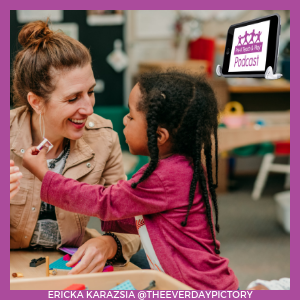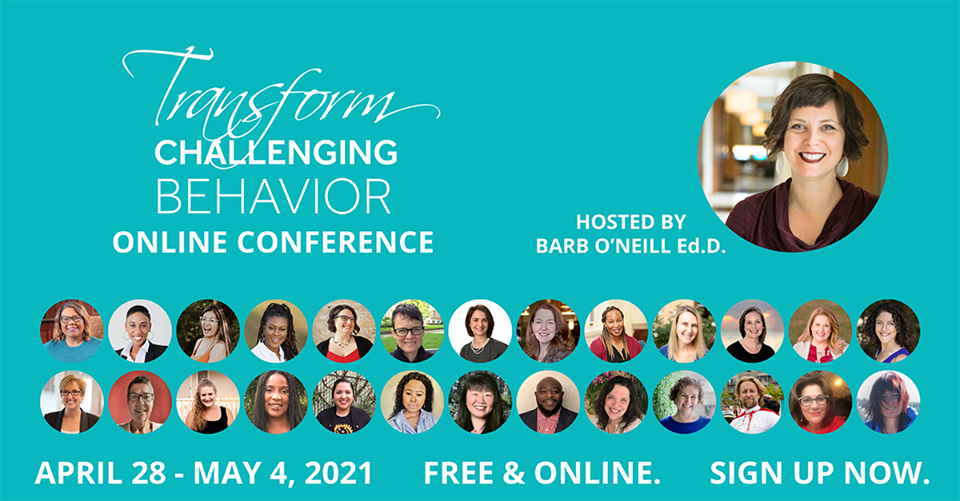 In this episode, I talk to Alyssa Blask Campbell about supporting and intentionally teaching self-regulation.
In this episode, I talk to Alyssa Blask Campbell about supporting and intentionally teaching self-regulation.
Or as Alyssa would say, “Helping tiny humans process big emotions”.
In this episode, we delve into the difference between coping mechanisms and coping strategies, what self-regulation is (and isn’t), and myths about how children learn to become increasingly self-regulated.
- The difference between coping mechanisms and coping strategies and how to use them to help children (and even yourself) process big emotions
- How the way self-regulation is “marketed” often misses the point by focusing on children learning self-control vs. expressing emotions, and why its important to let children express how they feel even when it is inconvenient to you
- How to set or maintain boundaries with children while also giving them the opportunity to process their emotions
- Why we should stop using the word “reinforcement”
- How sensory integration plays a major role in emotional regulation
- What the collaborative emotion processing (CEP) method is and how to implement it to respond to children’s emotions in a way that builds their emotional intelligence
LISTEN NOW
Click here to download a transcript of episode 33. Then scroll down for more information on the resources mentioned in this episode.
Click here for a full description of what the FREE toolkit includes.
Show Notes:
The focus of this annual conference, hosted by Barb O’ Neill, is to offer effective, strength-based strategies for supporting teachers (or other caregivers) who are struggling with children who exhibit challenging behavior. While the 2nd annual online conference was held in April of this year, you can still obtain a free resource guide as well as samples of each talk. If you request the resource guide, you will also have the option to purchase one of three packages (some of which include professional development certificates).
Register today.
Voices of your Village Podcast Episode 38- Coping Mechanisms vs. Coping Strategies: An Intro into the CEP Method [podcast]
In this podcast episode, the distinction between coping mechanisms and coping strategies is explored. In the Collaborative Emotion Processing (CEP) Method, coping is too often a missed phase. This podcast describes what coping mechanisms vs. strategies look like in practice, as well as tools that can be used with young children to make the process more tangible and accessible for them.
Collaborative Emotion Processing Method: An Approach to Emotion Coaching in a Social Constructivist Context [website]
The CEP Method is an approach that is designed to support emotional processing for young children. CEP is comprised of five components that provide adults with the tools needed to aid children in developing their emotional intelligence (EQ). In this context, EQ is defined as self-awareness, self-regulation, empathy, and social skills.
Seed & Sew: Homepage [website page]
The homepage for Seed & Sew’s website provides an overview of the topics, tools, and support you can find there.
EQ Quiz for ECE Leaders [online quiz]
Pulling from research on resonant leadership, appreciative inquiry, and neuroscience, emotional intelligence for ECE leaders can be conceptualized across five broad constructs: Self-awareness, self- regulation, situational awareness, social awareness, and spirituality. This quiz, developed by Dr. Kristie Pretti-Frontczak is offered in print and online formats, while a “results” coloring sheet is also available for free download.
Tiny Human, Big Emotions Village Membership for live workshops [membership website page]
Membership to this “village” offers research-based tools you can implement in your everyday life, access to a village of experts/parents/caregivers/teachers for support, a space to connect with any co-parenting partner(s) to navigate this journey, and access to live workshops where you can ask questions and build a foundation for supporting your children’s emotional development.
Self-Reg: How to Help Your Child (and You) Break the Stress Cycle and Successfully Engage with Life [book by Stuart Shanker]
This book is designed to help you learn to recognize when your child is becoming dysregulated and what to do about it. By learning Shanker method of self-regulation, parents learn that their own hidden stressors impact their brains, bodies, and responses (just like their children). The book helps readers distinguish between stress behavior and misbehavior, and how what appears to be a lack of self-control can sometimes actually be a sign of an excessive stress-load.
Voices of your Village Podcast Episode 53- The Triangle of Growth [podcast]
In this podcast episode, the three most crucial areas of development which work together are discussed at length and referred to as “the triangle of growth”. These areas include speech and language, sensory system, and emotional development. The podcast describes how each of these developmental areas work both separately and together to support child and human development.
How Sensory Processing Issues Can Affect Motor Skills [website article by Kate Kelly]
This website article describes “seven senses”, including vestibular and proprioception. It goes on to explain how these other two senses can affect motor development and/or skills, and what you can do to support children with these sensory processing needs.
“Sensory Diet” Treatment: What you Need to Know [website article by Kate Kelly]
This website article describes what is meant by a “sensory diet” and how it can be used as a part of sensory integration therapy. Examples, tips, and other resources are also provided.
Self-Regulation Institute Bio for Stuart Shanker [biography website page]
The Self-Regulation Institute website offers a succinct biography of Stuart Shanker’s career. Links to books published by Shaker are also offered.
Screen Time [website page by Zero to Three]
This page from the Zero to Three website provides links to a number of resources to support caregivers of infants and toddlers in learning about screen time and making decisions about how to address it in our digital age.
Voices of your Village Podcast Episode 4- Diving into the Sensory System with OT, Lori Goodrich [podcast]
In this podcast episode, occupational therapist (OT) Lori Goodrich describes the job of an OT. Lori shares how she plays a detective by looking closely at how children are processing sensory information and responding to different inputs. Lori describes how sensory integration is an important part of development and how we can support children who have sensory processing challenges.
The SPIRAL Foundation: About [website page]
The Sensory Processing Institute for Research and Learning Foundation is a nonprofit that provides resources for parents and professionals. The About page details who is on the board, staff, and otherwise involved with the foundation. A profile for OT Lori Goodrich is provided.
The Shanker Self-Reg® Toolkit for Educators [website page]
The MEHRIT Centre offers a growing kit of tools to help schools and teachers incorporate Self-Reg into their day-to-day practice and assess their Self-Reg progress and learning. The tool kit includes a classroom environment assessment checklist, a rubric for monitoring teachers’ Self-Reg learning and competencies, and various tools for gauging students’ self-regulation across different contexts.
Pre-K Teach and Play Podcast 14: Did you Know Every Child is a Triangle? [podcast]
In this podcast episode, Dr. Kristie Pretti-Frontczak describes where the mantra “every child is a triangle” originated and how planning, delivering, and revising instruction can be strengthened when we realize this. A transcript of the episode is also available.
Yale News- New Way to Combat Childhood Anxiety: Treat the Parents [website article by Bill Hathaway]
This website article details a new program developed at Yale, based on a randomized trial completed at the university, that is as effective as cognitive behavioral therapy in treating childhood anxiety disorders. The SPACE program helps parents handle issues arising from living with an anxious child.
Educalme: Homepage [website page]
Educalme is a program designed to equip and empower teachers to lead a calm, productive, positive, and empathetic classroom community. Educalme’s intention is to support teachers in creating a mindful environment for learning and growth in your classroom. The homepage provides numerous links to learn more about the program and various offerings, including a podcast.
Embracing Rough-and-Tumble Play: Teaching with the Body in Mind [book by Mike Huber]
This book offers practical, hands-on resources to support the incorporation of physical play into everyday routines and activities across contexts. Concrete advice for creating safe spaces for play as well as how to effectively implement big body movement is addressed.
The Future is Emotionally Intelligent- with Seed & Sew [Public Facebook group]
This is a public Facebook group for experts (pediatricians, developmental specialists, OTs, SLPs, teachers, etc.) and parents (including other caregivers). The group is intended to be a space where people can ask questions and collaborate to find solutions that will support the emotional development of young children.
Alyssa Blask Campbell has an M.Ed. in early childhood, is a leading expert in emotional development speaking to people around the world, podcast host for Voices of Your Village in over 60 countries, and Founder and CEO of Seed & Sew. Alyssa was featured as an emotional development expert in publications such as The Washington Post, Kids VT, and Family Education.
After co-creating the Collaborative Emotion Processing (CEP) method, she researched it across the U.S. and co-authored a book (coming in 2020). Alyssa is deeply passionate about building emotional intelligence as young as infancy, stating, “It’s never too early or too late to start.” Alyssa’s ‘show up as you are’ approach welcomes people into her village to get support at all ages and stages, shame-free.
Her company, Seed & Sew, serves people across the globe through speaking, consulting, and podcasting, with tools to live without anxiety, build an emotion processing toolbox, and raise emotionally intelligent humans. The team and village at Seed & Sew believe that everyone can benefit from, and find more joy, when they commit to building emotional intelligence.
Connect with Alyssa on FaceBook, Instagram, and/or Pinterest.
